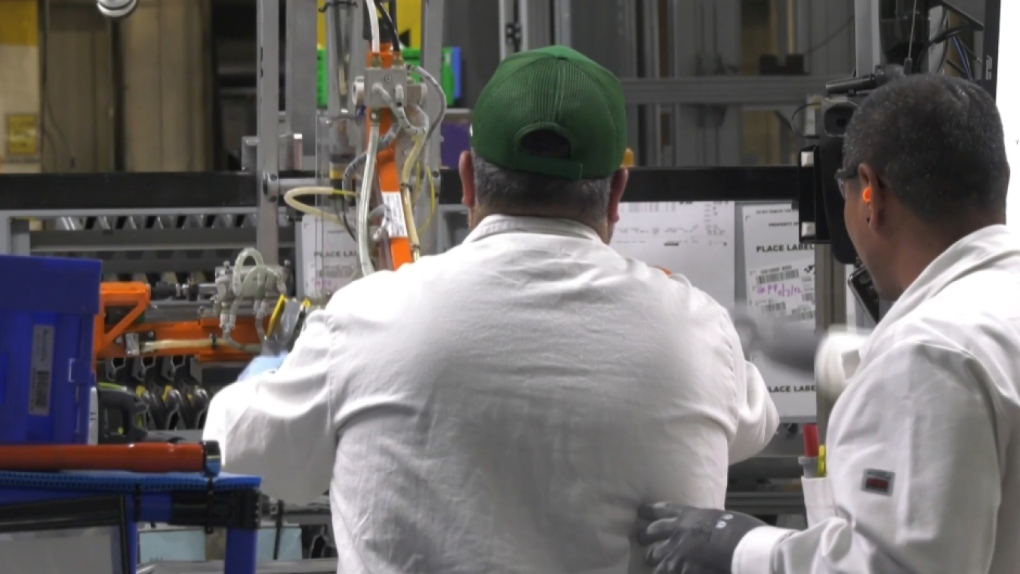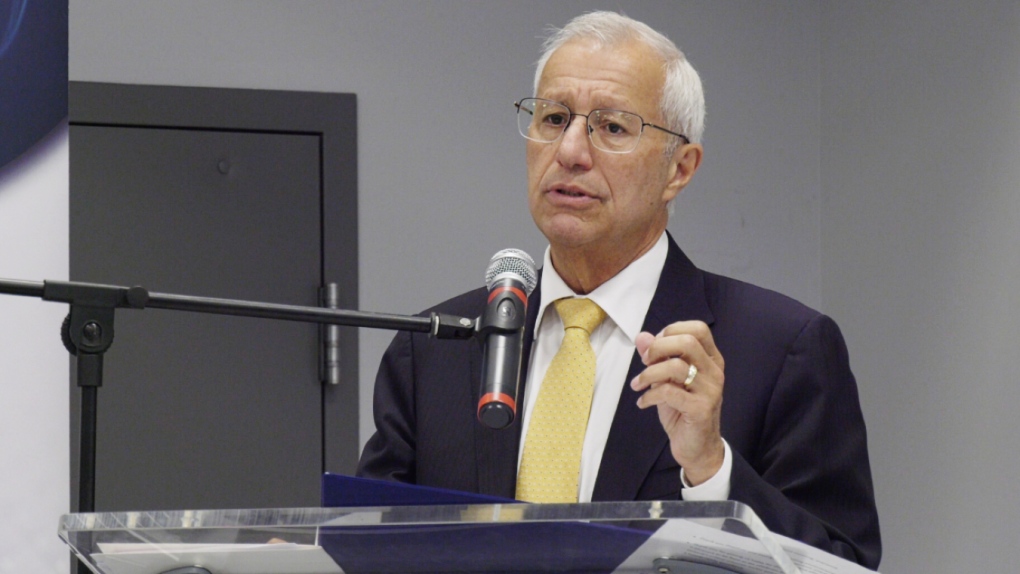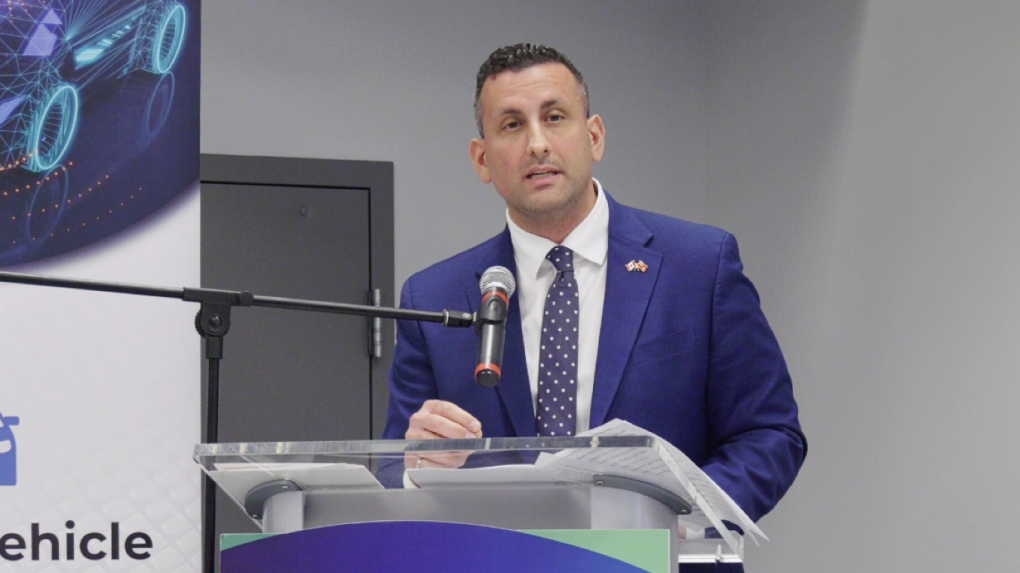Provincial funding aims to bolster electric vehicle job creation
To lay the groundwork for the automotive workforce of the future, the Ontario Vehicle Innovation Network (OVIN), the Ontario government and other partners are engaging youth about the jobs available in the critical minerals industry.
Critical minerals – including cobalt, natural graphite, lithium, manganese and nickel -- are crucial for building electric vehicles and EV battery production.
 To lay the groundwork for the automotive workforce of the future, the Ontario Vehicle Innovation Network, the Ontario government and other partners are engaging youth about the jobs available in the critical minerals industry. (Eric Taschner/CTV News)
To lay the groundwork for the automotive workforce of the future, the Ontario Vehicle Innovation Network, the Ontario government and other partners are engaging youth about the jobs available in the critical minerals industry. (Eric Taschner/CTV News)
Vic Fedeli, Ontario’s Minister of Economic Development, Job Creation and Trade, said the government's focus is on job creation.
“Our interest really is the jobs and making the battery and the components of the battery,” Fedeli said.
Building on findings of a strategy released in May, OVIN launched the Regional Future Workforce Critical Mineral Pilot Program for future job creation.
“If you look across the globe, it’s well known that Ontario is leading the future of the automotive sector,” said OVIN head Raed Kadri.
The government is chipping in $1.7 million so eight non-profit organizations and post-secondary schools in southern and northern Ontario can introduce students to careers of the future in critical minerals for electric vehicle and battery production.
Recipients in northern Ontario include Canadore College, College Boreal, Lakehead University and NORCAT.
 To lay the groundwork for the automotive workforce of the future, the Ontario Vehicle Innovation Network, the Ontario government and other partners are engaging youth about the jobs available in the critical minerals industry. Vic Fedeli, Ontario’s Minister of Economic Development, Job Creation and Trade, said the government's focus is on job creation.(Eric Taschner/CTV News)
To lay the groundwork for the automotive workforce of the future, the Ontario Vehicle Innovation Network, the Ontario government and other partners are engaging youth about the jobs available in the critical minerals industry. Vic Fedeli, Ontario’s Minister of Economic Development, Job Creation and Trade, said the government's focus is on job creation.(Eric Taschner/CTV News)
 OVIN head Raed Kadri said Ontario is a world leader in developing the EV automotive sector. (Eric Taschner/CTV News)
OVIN head Raed Kadri said Ontario is a world leader in developing the EV automotive sector. (Eric Taschner/CTV News)
“This is the first time that the north has been part of the auto sector in more than 100 years,” Fedeli said.
Canadore's Innovation Centre for Advanced Manufacturing and Prototyping opened its doors to more than 100 secondary school students from Nipissing, Parry Sound and West Nipissing.
They are learning about electric vehicles, sustainable energy, and critical mineral extraction/processing sectors. Canadore received $108,825.
“We’re introducing high school students to the careers that are becoming available as this sector continues to evolve,” said Canadore president George Burton.
“Collectively, we’re building that workforce.”
- Download the CTV News app now
- Get local breaking news alerts
- Daily newsletter with the top local stories emailed to your inbox
Within the program, post-secondary institutions and non-profit organizations hosted workshops, day camps and other educational and training activities in partnership with mining and EV battery technology industry leaders, school boards, Indigenous communities and other stakeholders in Ontario’s critical minerals sector.
Delivered over two months, the eight projects engaged about 5,000 students, primarily in northern Ontario, providing them with an opportunity to learn about electric vehicle and battery technologies and explore career opportunities in the mining industry.
"The province is not leaving one part of this out," Kadri said.
"They’re bringing in the manufacturers. They’re building up our suppliers. They’re inspiring the next generation of our tech companies and they’re making sure we have all the talent to power all this."
The program’s goal is to find more than 3,000 new workers in the province’s critical minerals sector by 2040 to fill future job gaps in electric vehicle and battery production.
CTVNews.ca Top Stories

Back on air: John Vennavally-Rao on reclaiming his career while living with cancer
'In February, there was a time when I thought my career as a TV reporter was over,' CTV News reporter and anchor John Vennavally-Rao writes.
The winter solstice is here, the Northern Hemisphere's darkest day
The winter solstice is Saturday, bringing the shortest day and longest night of the year to the Northern Hemisphere — ideal conditions for holiday lights and warm blankets.
Poilievre writes to GG calling for House recall, confidence vote after Singh declares he's ready to bring Liberals down
Conservative Leader Pierre Poilievre has written to Gov. Gen. Mary Simon, imploring her to 'use your authority to inform the prime minister that he must' recall the House of Commons so a non-confidence vote can be held. This move comes in light of NDP Leader Jagmeet Singh publishing a letter stating his caucus 'will vote to bring this government down' sometime in 2025.
School custodian stages surprise for Kitchener, Ont. students ahead of holiday break
He’s no Elf on the Shelf, but maybe closer to Ward of the Board.
Kelly Clarkson's subtle yet satisfying message to anyone single this Christmas
The singer and daytime-talk show host released a fireside video to accompany her 2021 holiday album, “When Christmas Comes Around” that she dubbed, “When Christmas Comes Around…Again.
Judge sentences Quebecer convicted of triple murder who shows 'no remorse'
A Quebecer convicted in a triple murder on Montreal's South Shore has been sentenced to life in prison without chance of parole for 20 years in the second-degree death of Synthia Bussieres.
At least 2 dead, 60 hurt after car drives into German Christmas market in suspected attack
A car plowed into a busy outdoor Christmas market in the eastern German city of Magdeburg on Friday, killing at least two people and injuring at least 60 others in what authorities suspect was an attack.
16-year-old German exchange student dies after North Vancouver crash
A 16-year-old high school student from Germany who was hit by a Jeep in North Vancouver, B.C., last weekend has died in hospital, authorities confirmed.
Poilievre to Trump: 'Canada will never be the 51st state'
Conservative leader Pierre Poilievre is responding to U.S. president-elect Donald Trump’s ongoing suggestions that Canada become the 51st state, saying it will 'never happen.'


































